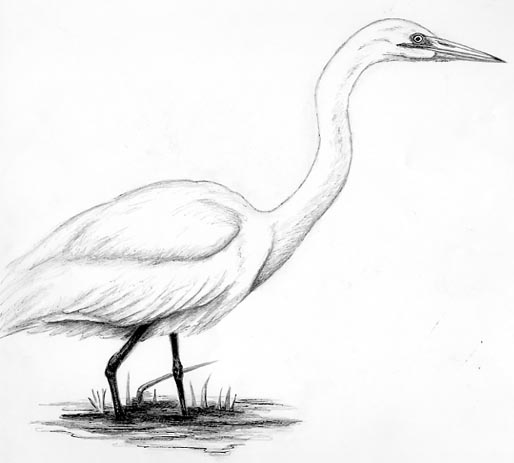
Dear Bird Folks,
First of all I’d like to say that I enjoy reading your columns so much that I cut them out and mail them to my friends in Virginia. My question is about herons. I’ve seen several Great White Herons hanging out in a local marsh. Will they be there all winter or will they be heading south with everyone else?
-Margie, Chatham, MA
Oh Margie,
Thank you for those nice words. I’m glad you enjoy reading our column. Some weeks the questions are a bit too long and I have to cut out a line or two, but there is no way I was going to cut out any of your compliments. I only wish you had written them in bold letters. I would have left that in too. Also, my mother would be thrilled by your note. Not because of the compliments, but because you are cutting stories out of the newspaper. My mother is the queen of newspaper cutting. Every letter that I receive from her has at least forty-two pounds of clippings stuffed in the envelope. Most people read the paper while holding a cup of coffee, my mother reads while holding a pair of scissors. By the time my poor late father got to read the morning paper it looked more like a fishing net than an actual newspaper.
Now that we have gotten the nice stuff out of the way, I have to break the news to you about those Great White Herons you are seeing. They aren’t herons, they are egrets. Although the names heron and egret are somewhat interchangeable, usually the white, heron-like birds are called egrets. Right now you are screaming, “but my bird book has a very large, white, heron-like bird and they call it a ‘Great White Heron,’ not an egret.” Okay, calm down Margie. Let’s take this one step at a time and no one will get hurt.
Your bird book does indeed have a bird called the “Great White Heron,” mine does too. But you should also make note of where it is found. The Great White Heron has very limited range. It lives mostly in the Florida Keys, where it ekes out a meager living making hammocks. Another thing to note is, even though it is a totally white bird, it is not considered to be an egret, but a heron. Scientists first thought the Great White Heron was its own species, but now it is considered to be nothing more than a white morphed Great Blue Heron. I don’t know if anyone really understands exactly why, but for some crazy reason southern Florida has a large population of pure white Great Blue Herons that are found nowhere else.
Of course it is possible that one of these weird herons could find its way to Cape Cod by accident; after all a manatee was recently spotted near Newport, RI. And it seems to me that about ten years ago a Great White Heron was reported in Nauset Marsh. So now you are thinking “Hey, if it visited here ten years ago, why couldn’t there be one around now? Yes, I agree, there could be one, but you claimed to be seeing “several.” The word several is what makes me pretty sure you are seeing the large and equally white, but far more common, Great Egret. Don’t be disappointed Margie, Great Egrets are very important birds and here is why.
The Great Egret, along with its smaller cousin the Snowy Egret, were all but wiped out back in those whacky days when people thought bird’s feathers looked better on lady’s hats than they did on the birds themselves. The plight of the egrets became the focal point of the early conservation movement and the Great Egret is now the familiar logo of the National Audubon Society.
With protection the Great Egret population has rebounded nicely and now the bird can be found throughout much of its former range, including here on Cape Cod. On many summer evenings, as am I leaving my shop for the day, I see those beautiful white birds flying overhead, as they make their way towards their roost for the night.
Now that we have established which bird you are seeing in your local marsh Margie, I can finally answer your question. And that question is, ah, hmmm. Does anybody remember? Oh yeah, will these egrets, be staying here all winter? The answer is, no, of course not. They have enough white in their lives already without spending three months dealing with snow. The egrets are done nesting for the season. They start moving south in the middle of September and are pretty much gone by the end of October.
Thanks again for the nice words about our column Margie. If you ever get tired of clipping it out and sending it to your friends in Virginia just let my mother know, she’d be happy to do it for you.